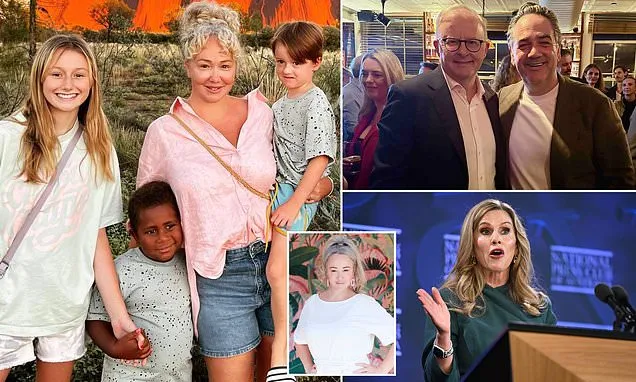My teen daughter has been sent vile comments on Facebook, pressured for nudes on Snapchat, blackmailed on TikTok, and even witnessed a murder on Instagram.
And yet, despite all of this, I don't support a social media ban for under-16s in Australia.
The government says the ban - which comes into effect on December 10 - is designed to limit the harmful impacts of social media on children, and the move has been applauded at the UN as a 'world-first'.
Under the new laws, platforms must take 'reasonable steps' to prevent Australian kids from creating accounts on their websites, and deactivate existing ones.
But as far as I'm concerned, this is doomed to fail. It won't protect children, nor will it keep them safer - and it might actually make things worse.
Have you ever met a teenager? They are invariably more tech-savvy than most parents, and far more so than the politicians in Canberra behind this scheme.
While we're fumbling with the Wi-Fi, they're downloading VPNs, making burner accounts and logging into platforms we've never heard of.
If they want to get online, they will - and bans will only push them towards secrecy and lies.
Daily Mail senior reporter Jonica Bray (above, with her husband and children) says the under-16s social media ban risks pushing teenagers into secrecy and darker corners of the internet.
Prime Minister Anthony Albanese and radio presenter Michael 'Wippa' Wipfli - who has long campaigned for an under-16s social media ban - celebrated at an Australian pub in New York City after they spoke about the 'world-first' legislation at the United Nations last month.
Australia's eSafety Commissioner Julie Inman Grant has put social media companies on notice - but she is keen to emphasise that the legislation is more of a 'delay' than a ban.
Yes, social media is toxic. It can be dangerous, addictive and harmful.
It's filled with predators, bullying, distorted body ideals and harmful algorithms that fuel endless doom-scrolling - eroding girls' confidence and radicalising lost boys.
I've seen it. I know it. But pretending a law will keep kids away is naïve.
Instead of protecting them, the ban risks creating a hidden online world. Parents may think their kids are 'safe' while, in reality, they're still exposed and totally unmonitored.
As a parent, I would rather face the ugly truth. I would rather have the arguments, the awkward conversations, the eye-rolls at the dinner table than pretend an untested law will keep children offline. Teenagers will bypass it in minutes.
And here is the bigger problem.
While the government pats itself on the back, the real culprits, the social media giants, walk away untouched. These billion-dollar companies put profit before people every single day.
Just the other week, my 17-year-old sat on the school bus and watched, frame by frame, a graphic video of Charlie Kirk being shot at an American university.
Photos and clips of the assassination appeared in her feed just like cat videos. At what age do we decide that is acceptable? Never. Not at 17, not at 27, not at any age.
I thought it'd be a 'family friendly' holiday - but there's a side to Japan they don't talk about...
And yet there it was. No warning. No filter. Just another clip spat out by an algorithm.
I have given up reporting content on Meta. Racist abuse? Ignored. Homophobic bullying? Apparently fine. Even when I report death threats, I receive the same infuriating message: 'This does not go against our guidelines.'
If the Australian government wants to make a difference, forget headline-grabbing bans. Force these platforms to regulate. Fine them until it hurts.
Stop allowing billion-dollar corporations to replace their own safety teams with AI bots while real children are left to sift through what gets missed.
And let's just imagine for one second that the ban actually works.
Do we really believe the dangers disappear on a child's sixteenth birthday? All this law does is throw them in the deep end with no practice, no lessons, no lifelines then tells them to swim. That is not protection - that is negligence.
Worse, the ban risks creating a divide.
Wealthier, tech-savvy kids with VPNs and multiple devices will stay online; poorer children with less access to money and information won't. Suddenly, we have a hierarchy of who is connected and who is cut off.
'Wealthier, tech-savvy kids with VPNs and multiple devices will stay online; poorer children with less access to money and information won't,' writes Jonica
Think I'm being dramatic? Ask teenagers how well the high-school phone bans are working. Ask how many bring burner phones to lock inside those expensive magnetic pouches the government spent millions on.
And what about vulnerable kids? The ones who haven't found their place in the schoolyard but have found comfort in online friendships that bring them joy?
What about the teenagers in rural towns, for whom a screen is their only connection with other teens? For them, social media isn't poison - it's a lifeline. Taking it away doesn't protect them - it punishes them.
The truth is, parents who believe this ban is the answer to their prayers are fooling themselves. They'll sigh with relief, point to the government and think the job is done.
But their children will still be able to access hardcore porn with a click, encounter predators in gaming chatrooms, and find the dark web if they wish.
This ban does not make children safe. It only gives parents a false sense of security while teens disappear deeper into a world we can no longer see.
I would much rather teach my kids about the dangers of social media platforms now, while I still can.
I want to guide them, correct them, argue with them and prepare them for a digital world that isn't going anywhere.
